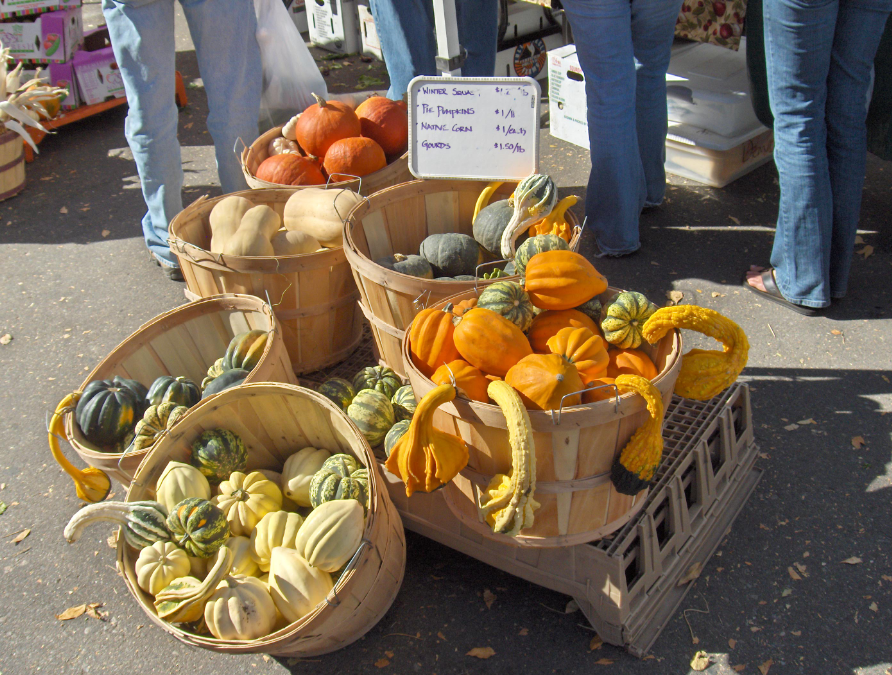Quick Facts…
- An abundance of flavorful, high quality produce is grown in Colorado.
- Shopping at farmers’ markets offers opportunities to select ‘just picked’ fresh produce and try unique locally-made products.
- Following these practical tips can help you enjoy the many flavorful offerings of our local farmers’ markets.

Farmers’ Market Shopping Tips
- Go early for the best selection.
- Check out all the booths before making your choices. There is generally a large and colorful variety of produce and locally-made food products.
- Cash is always accepted but many of Colorado farmers’ markets also accept credit cards and Electronic Benefit Transfer (EBT) cards that enable food stamp transactions at farmers’ markets.
- Bring cloth shopping bags. They are sturdier and much better for corn! Or, reuse clean plastic bags. Insulated bags work well for cold or frozen foods.
- Wear comfortable clothing, shoes and sunscreen. Bring a camera since there are great photo opportunities.
- Take your time and get to know your local vendors and their foods. Many booths offer cooking tips or recipes.
- Try a new item each time you visit a farmers’ market – you may discover a favorite food. Ask the vendor for handling and preparation instructions.
- Share the bounty – take some fruit or flowers to a friend or neighbor. Extra produce can also be frozen, dried or canned for out-of-season enjoyment.
- Go home soon after making your purchases in order to maintain peak quality. Bring a cooler with cold packs or ice to keep perishable foods cool on the way home. Place delicate produce, like leafy greens, on top of cold packs.
Food Safety Recommendations
At the Market…
Keep produce that needs to be refrigerated at home cool at the market. Keep perishable foods on ice or at refrigerated temperatures. What are perishable foods? Foods such as eggs, cheese, meat, cream pies and some types of fresh produce that require refrigeration, like leafy greens. Plan on buying perishable foods last during your trip to the market. Keep hot foods, like roasted peppers, separate from other foods. Reusable cloth and vinyl bags are good options for the market but they need to be washed regularly.
On the Way Home…
Try to make the farmers’ market the last stop on your list so you can go directly home. If it can’t be your last stop, plan ahead and bring a cooler with ice packs for perishable items. Bacteria can grow readily at warm temperatures and quickly cause a decrease in food quality and safety.
At Home…Fresh Produce Storage
- Washing produce before storing is not recommended as this may promote deterioration. Always wash fresh fruits and vegetables with running water just before use.
- Store refrigerated produce in plastic bags with holes to let air circulate.
- Most fresh produce has a short shelf-life and should be used within a few days. However, apples, onions, potatoes, and winter squash can last much longer.
- Not all produce should be stored together. Apples, tomatoes and melons produce ethylene gas and should be stored away from other produce.
- Store unripened peaches, plums and apricots at room temperature in a paper bag until ripe. Refrigerating unripened produce slows down the ripening process.
- Tomatoes and melons can be stored at room temperature until ripe or cut and then refrigerated.
If you plan to can or freeze your market produce, follow USDA food preservation guidelines with adjustments for high altitude.
In the Kitchen…
Follow basic safety rules; keep hot foods hot, cold foods cold, and cutting surfaces and utensils clean.
- Hand
Washing
- Rinse hands with
clean, warm water.
Apply soap and lather for 20 seconds.
Rinse clean with warm water.
Dry hands with a clean cloth or paper towel.
- Rinse hands with
clean, warm water.
- Preparation
- Rinse leafy vegetables
under plain cold water, leaf by leaf.
Scrub tough produce (melons, potatoes, and carrots) with a clean firm brush under cold running water.
Using soap or bleach to clean produce is not recommended.
Always use clean and sanitized cutting boards and utensils.
- Rinse leafy vegetables
under plain cold water, leaf by leaf.
- Serving
- If your food needs to
be transported in hot weather, keep it in a cooler on ice until it’s ready to
serve.
Keep unwashed melon rinds and fruit peels away from edible or washed portions of fruit.
Discard cut produce after two hours at room temperature.
- If your food needs to
be transported in hot weather, keep it in a cooler on ice until it’s ready to
serve.
Resources
9.310 Food Storage for Safety and Quality,Colorado State University Extension.
9.369 Preventing E. coli from Garden to Plate, Colorado State University Extension.
9.373 Health Benefits and Safe Handling of Salad Greens,Colorado State University Extension.
More fact sheets on food safety, storage, and health benefits of fresh foods are available online athttp://extension.colostate.edu/topic-areas/nutrition-food-safety-health#publications/
1M. Bunning, Colorado State University, food science and human nutrition, Extension food safety specialist and assistant professor; S. Yeh, graduate student, food science and human nutrition, 3/10.
Colorado State University, U.S. Department of Agriculture, and Colorado counties cooperating. CSU Extension programs are available to all without discrimination. No endorsement of products mentioned is intended nor is criticism implied of products not mentioned.

